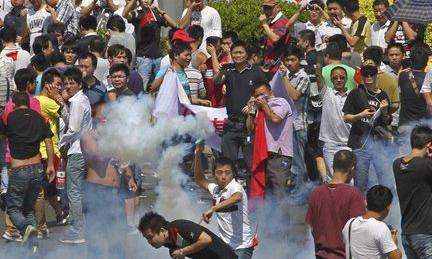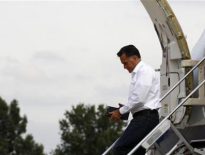Japanese electronics maker Panasonic has suspended some of its operations in China after anti-Japan protesters attacked two of its factories.

The firm said its factory in Qingdao will remain shut until 18 September.
According to media reports, Canon has also suspended operations at three of its Chinese factories.
The attacks are a part of wider protests that have spread across China and hurt other firms, including car manufacturer Toyota.
They started after Japan said it had agreed a deal to buy a chain of disputed islands in the East China Sea from their private Japanese owner.
China has maintained its sovereignty over the islands which are also claimed by Taiwan.
A spokesperson for Panasonic told the BBC that the firm would continue to monitor the situation over the next two days.
‘Directly affected’
The disputed islands, known as Diaoyu in China and Senkaku in Japan, are uninhabited but resource-rich.
They have been a contentious issue between the two countries, and were the focus of a major diplomatic row between them in 2010.
The dispute flared up again over the weekend after Tokyo said it had agreed to purchase them, leading to thousands of protesters taking to the streets in various parts of China.
The demonstrations saw protesters burning Japanese flags and targeting Japanese-made cars.
There have been reports of a Toyota dealership in China being damaged during the demonstrations.
On Monday, the Bloomberg news agency reported that Canon had also suspended operations in three of its factories in China until 18 September.
Canon did not immediately respond to a query from the BBC to confirm the reports.
Analysts said the dispute had started to affect Japanese firms operating in China.
“We are definitely seeing that Japanese companies are being directly affected by the protests,” Shaun Rein of China Market Research Group told the BBC.
Bigger impact?
The attacks on some Japanese businesses have raised fears about the impact of the protests on Japanese investment in China.
Analysts said that China, which was known for being a low-cost manufacturing base, has seen a steady rise in labour costs in recent times, negating a big advantage it had on other countries in the region.
They said that the protests could result in some Japanese firms starting to look beyond China for further expansion.
“They might want to consider expanding manufacturing operations in Thailand or in other nations that are more welcoming towards Japanese investment,” said Mr Rein of China Market Research Group.
He warned that such moves might have an impact on China’s economic growth and also on the overall trade ties between Asia’s two biggest economies.
“The trade relations are going to be damaged by the continuing protests, for sure.”





